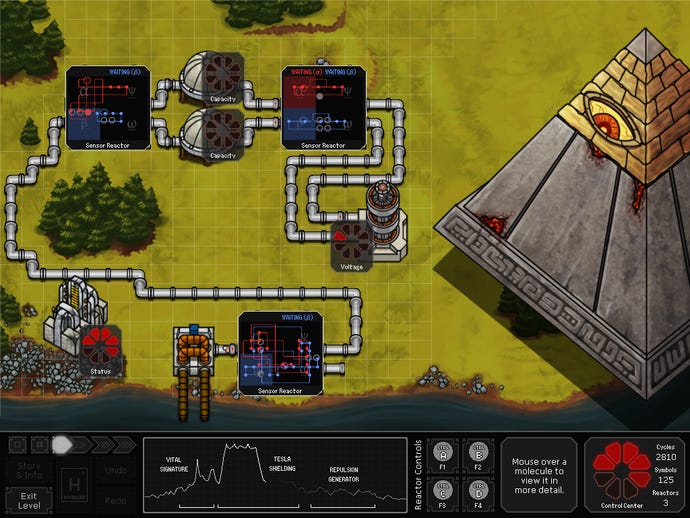HomeFeatures
Would you play a Warhammer 40K factory game? Because Zachtronics almost made oneHow the creators of SpaceChem and Eliza flirted with the grim darkness of the far future
How the creators of SpaceChem and Eliza flirted with the grim darkness of the far future
Image credit:Games Workshop / Fantasy Flight Games / Rock Paper Shotgun
Image credit:Games Workshop / Fantasy Flight Games / Rock Paper Shotgun
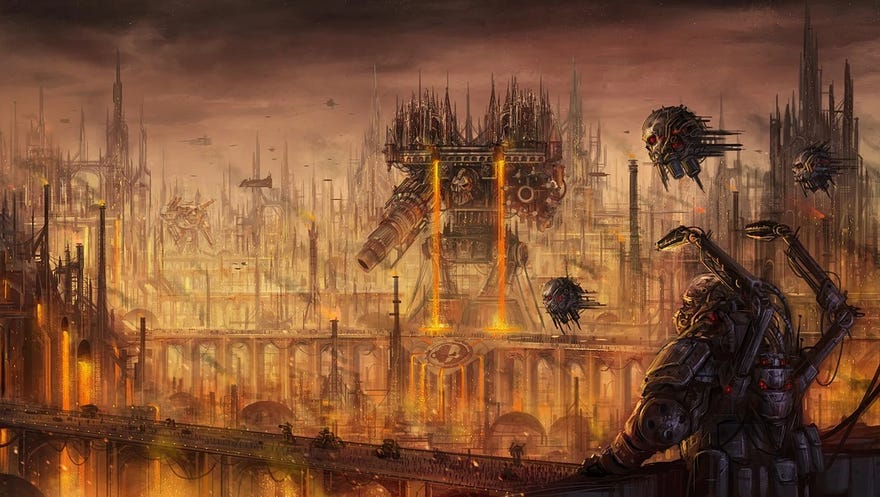
These factories aren’t exercises in empire-building, however, likeFactorioandSatisfactory. They’re compact and level-based, artisanal conundrums of great intricacy and difficulty, which typically position you as a worker on the production line, rather than a crusading tycoon. In 2011’sSpaceChem- which a youthful Quintin Smith (RPS in peace)branded"straight-up genius" - you’re a reactor engineer assembling atoms into molecules on behalf of an alien warboss. In 2016’s Shenzen I/O - which a similarly waifish Brendycalled"polished and compelling" with “a subtle sense of numberdread” - you’re stringing together circuits for door buzzers and missile systems in China’s Silicon Valley. As those two examples illustrate, Zachtronics factory games aren’t abstract puzzlers. They often have veins of social commentary, but these are far from didactic: any worrying undertones or traces of cautionary tale must be fished out of the clockwork as you go.
A round-up of Zachtronics games - from top left, Infinifactory, Opus Magnum, the Zachtronics Solitaire Collection and their anthology release, Last Call BBS. |Image credit:Zachtronics Industries
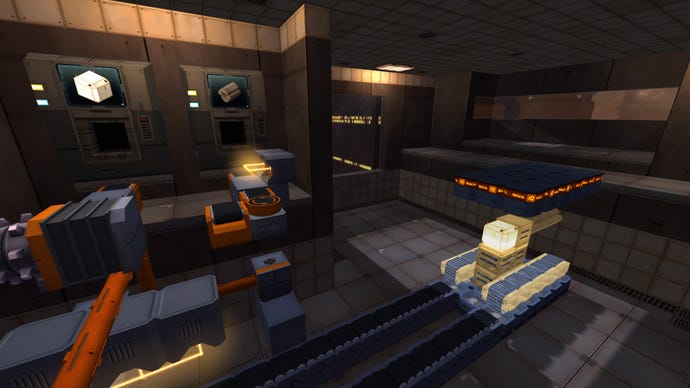
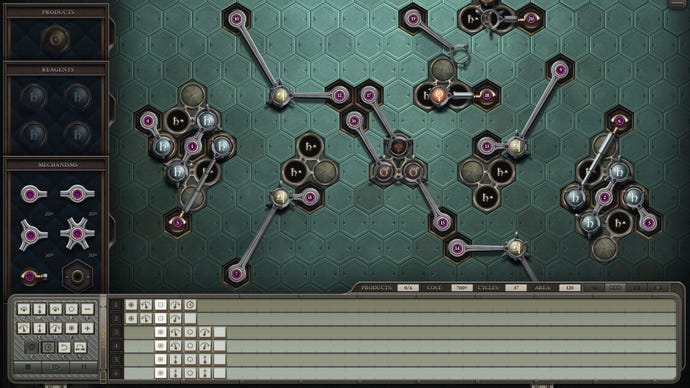
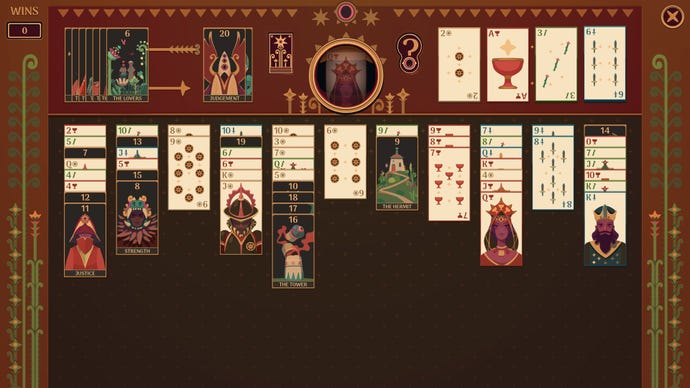
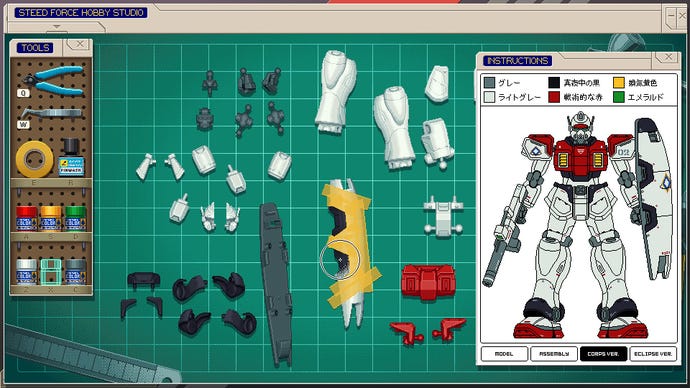
Warhammer 40,000 has more than a few factories. Some are as big as planets - seething furnace worlds that go down miles, where ancient clans of labourers heave away devoutly for generations, without ever glimpsing the sky. The Imperium Of Man as a whole is a monstrous exercise in mass production, with countless outputs - bolter shells to the frontlines, stray psykers to the God-Emperor’s table. The idea of Zachtronics making a game about such things feels like a match forged upon heaven’s conveyor belt. So it’s a shame that it didn’t quite happen - partly due to more routine questions of money and creative control, but also, due to Barth’s complicated, half-admiring and half-repulsed attitude towards the setting.
Barth first ‘got into’ Warhammer 40,000 thanks to video games, many moons ago - he played a “shitload” ofWarhammer 40,000: Dawn Of Warwith college friends in the early noughties. In the process, he developed a cautious enthusiasm for Warhammer 40,000’s rancid supporting fiction. The table-top game itself? Not so much. “I once, many years later, tried playing the actual miniatures game,” he tells me over videocall. “I have a friend who’s obsessed with it - like,obsessedobsessed with it, went too too deep into buying plastic and not being able to paint it all, that kind of obsessed. And so, finally, years later, I got to play it and it fucking sucks.
“I really don’t have a lot of patience for many games, especially board games, especially tabletop miniatures games,” Barth continues. “And it’s funny because it’s the kind of thing I want to love, but I just can’t fathom how you can play something like that and be like, ‘yeah, I want to do this again’. Like, the games last hours! It’s like four turns in an hour, just so much dice rolling!
Barth doesn’t think the original Dawn Of War has aged very well. I’m going to throw him to the comment-wolves and say: do you agree? |Image credit:Sega
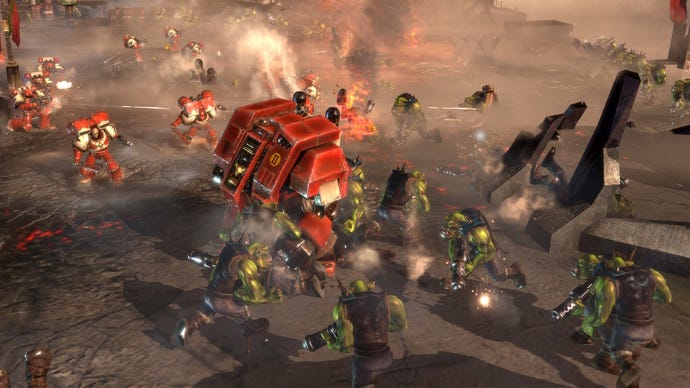
If Warhammer 40K video games precipitated Barth’s interest in Warhammer, the notion of making one himself came principally from parodies of Warhammer 40,000 and comparable works of sci-fi. Specifically, he points to Something Awful’sBlue Stripeseries of interviews with holodeck janitors, Weyland-Yutani cryotechs and Space Marine chapter gofers.
Barth’s interest in Warhammer 40,000 also grew after he read Hiroki Azuma’sOtaku: Japan’s Database Animals, a book about the spread of otaku culture and “database storytelling”, where there is no strict chronology and fan fiat reigns supreme. Warhammer 40,000 is, Barth suggests, “the ultimate western otaku database IP property”, more so even than Star Wars, simply because it began life as a tabletop rulebook rather than a story.
The lure of Games Workshop’s grimdark universe aside, Barth and his colleagues felt a more diffuse urge to work on a licensed game for the career bonafides. “I have friends and stuff who worked on licensed games,” Barth says. “I have a friend who worked at an Activision studio and worked on almost nothing but movie tie-in games. I, we, never worked on any licensed games. And this was earlier in our game design career - like now, I’m totally jaded and don’t give shit about anything. But back then, it was like, oh, it’d be interesting to work on a licensed game, just to say we’ve done a licensed game.”
Barth started thinking in earnest about a Warhammer 40K pitch in early 2017. “We would have been deep in production onOpus Magnum,” he recalls. “We were at the point where we knew what the game was. I had done all my work, making the puzzles - we’re just waiting on the artist to make the just terrible amount of art that we always have to put in our games. And so I’m just like, well I got nothing to do, I guess I’ll start thinking about our next game. And so, in February, I emailed Games Workshop to say hey, let’s talk about licensing, you know?”
Warhammer 40K Space Marine pc game, Titan Invictus in Manufactorum AjakisA scene from a manufactorum in the original Warhammer 40,000: Space Marine, complete with motivational PA system. Remember, “increased productivity gains high favour from the Machine Gods.“Watch on YouTube
Warhammer 40K Space Marine pc game, Titan Invictus in Manufactorum Ajakis

More precisely, he envisaged a game that cast you as a junior member of the Adeptus Mechanicus - the machine-worshipping priesthood who operate as an empire unto themselves within the Imperium. “I think the idea would be that it would take place on a Forge World, and you would be one of those guys with all the arms coming out of your back, and your boss is like a guy with even more arms coming out of his back,” Barth pithily summarises. “And you’re just doing your job.” Like Shenzhen I/O, the game might have been a “workplace comedy, except that it’s set in a Warhammer 40K factory, where you’re pumping out power armour and stuff”.
It sounds, to me, like a natural fit. And Barth’s initial discussions with Games Workshop were encouraging. “The 40K game was the first time we ever approached an IP holder and, and they’re actually really easy to contact,” he adds. “There’s an NDA, so I have to be vague about some parts of it, but we contacted them, they got right back to us, and we talked to them, we signed an NDA, they were super forthright with their terms, and how it works.”
Barth has had many conversations with license holders since, and feels that Games Workshop are more receptive than many to video game pitches of all shapes, sizes and, well, degrees of quality. “In my very limited experience of not licensing IP, they’re totally open to whatever, and I think this explains why you see so many Warhammer 40K games, including ones that are actually quite low budget, and, and I think also, why so many of them suck!” he enthuses.
“And they’re the ones with all the power, so why would they put themselves at any risk, you know? Games Workshop, to their credit, have arrangements that are more indie-friendly, which nobody else that I’ve talked to seemed to make. I think this explains why you see 40K ‘indie’ games, basically.”
Image credit:Focus Entertainment
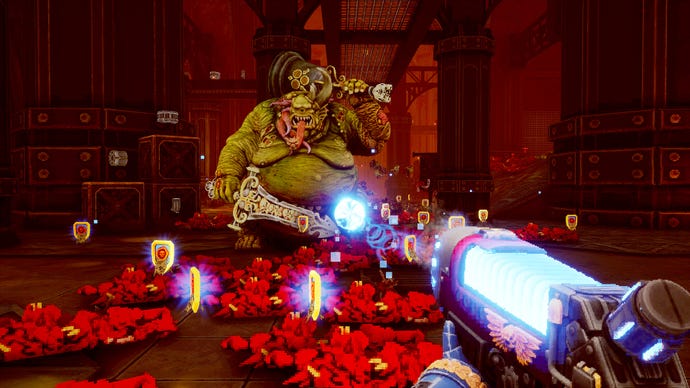
Games Workshopdidwant a chunk of dosh upfront, however. They also, as you’d expect, wanted some creative control, and Barth was unconvinced that the pitch was worth these sacrifices. “Not only do we not want to make a game that’s straightforward… like we don’t want to make a 40K game that’s about killing things, are any 40K enthusiasts really gonna want to play it, is it gonna help us a lot? Is it going to help us, for the amount that they’re going to take, right? Also, it means that we’re going to have IP lawyers telling us like what our characters can and can’t do, and what we can’t do mechanically.”
“We make games about building factories, but people don’t really build factories in the universe of 40K,” says Barth. “In fact, it’s heresy to build new things in the world of 40K, right? That’s kind of inconvenient for our purposes. And if we were building this story [independently], we would be able to say ‘well, let’s back off on the heresy jokes, because we actually need characters that are able to do new things’, right? Not when you’re licensing somebody else’s IP - you’ve got to work around those limitations.” Zachtronics has always set a high price on originality, he notes. “The part of the game that we like doing the most is inventing stuff. Like, we’ve never made a sequel to any of our own games.”
Warhammer 40,000’s ironclad ritualised cosmos of zealots and witchfinders is, of course, satirical: it’s a knowingly grotesque portrayal of mass paranoia and bigotry. But the satire often disappears into the greebling: the setting is played very straight and, as such, is easy to co-opt andturn into actual far-right propaganda. Barth struggled with this aspect of his Warhammer 40,000 pitch both out of queasiness toward the values depicted, and for more practical reasons. For one thing, he wasn’t sure how to calibrate their potential game’s humour - or even if it was allowed to be humorous at all.
“We really didn’t do a ton of work on these ideas, but when talking to the person from from Games Workshop, we were like, for the tone of the game, we imagined it would be a comedy,” he recalls. “It’s a funny thing, you know? And so that was one of my questions to him: are you guys okay with us making funny stuff in the world of 40K? And he’s like: what do you mean? They’re all funny, it’s a funny setting. I’m just like: is it? And he’s like, yeah it’s, you know, funny. I’m just like, I don’t know if Americans see it that way!”
Image credit:PLAION
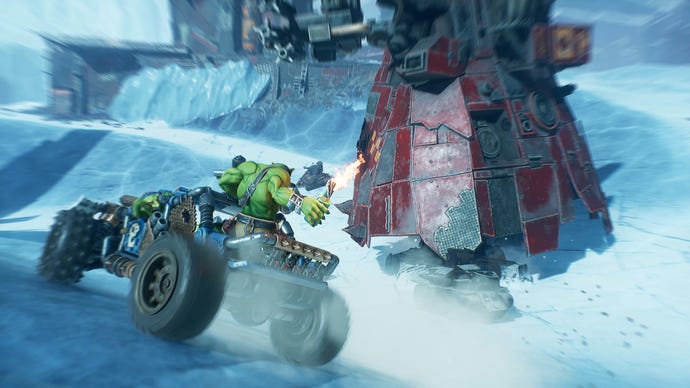
“And, you know,Helldivershasthe same discourse. Like people are always accusing other people of not understanding that it’s a joke, but at the same time it’s clearly notjusta joke, you know? And it’s weird. I got in a big argument with all of my friends - they’re like: Helldivers is a satire. I’m like: but is it? Just to say it’s a satire - what’s it skewering? They’re like, oh I don’t know. You mean that it’s a parody, maybe? I’ve literally gotten into a fight with everybody I know about this.”
If all of these factors weighed down the prospect of making a Warhammer game, it was the upfront licensing fee that eventually turned Zachtronics away, for all Games Workshop’s relatively generous terms. “It was just so hard to justify giving somebody so much money for that,” Barth says. “If it was free, I think we like 100% would have done it. I think it really is just a money thing, because you’re right, the creative challenges, they seemed interesting, right? We’re not often presented with those kinds of limitations and I think limitations, when applied correctly, can be a huge boon to creativity, right? But not when that price tag comes on it, you know - that’ll sink a project.
“Zachtronics was never a hugely successful studio,” he adds. “We were always just kind of on the edge of making enough money to not have to go get real jobs, you know. And to give somebody else so much money put us at a huge personal risk, even with their generous terms that were friendly for indies. I don’t know - the gamble you’re taking is that the game is going to make substantially more money because of the IP, and I’m not a gambling man. I play it safe with all of our business decisions, and it just seemed too risky.”
A scene from SpaceChem. No, that isn’t a Necron pyramid on the right. |Image credit:Zachtronics Industries
